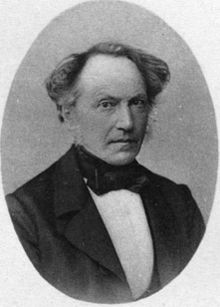Gustav Pfizer
Gustav Pfizer (born July 29, 1807 in Stuttgart ; † July 19, 1890 ibid) was a German author and translator and since 1838 editor of the Morgenblatt for educated classes . He is assigned to the Swabian School of Poetry .
Life
Pfizer came from a family of lawyers; his father was director of the Stuttgart Upper Tribunal , his older brother Paul Pfizer became minister of culture and an influential publicist. Pfizer attended a grammar school in Stuttgart and then switched to the theological seminar in Blaubeuren . He studied theology and philosophy in Tübingen from 1825 to 1830 , where he became a member of the Germania Tübingen fraternity in 1825 . Then he worked as a tutor at the Tübinger Stift and in 1846 became a literature teacher at a Stuttgart high school. He remained in this position until 1872. In 1849 he also became a member of the first constitution-revising state assembly of Württemberg .
In 1831 his first volume of poetry came out in Stuttgart; this volume of poetry is considered Pfizer's first publication. Also in 1835, after a trip to Italy, he published poems by Gustav Pfizer in the Paul Reff publishing house in Stuttgart; Around 1850 another volume of poetry came out in Meyer's Groschen library of classics for all estates (volume 252).
Pfizer benefited from the preference of his time for foreign authors and was therefore defamed as a translation machine [sic!] By his contemporary Gutzkow . From 1836 he was part of the editorial team for the newspaper on the customer of foreign literature. From 1835 to 1839 he translated the works of Lord Byron ; In 1840 his translation of Edward Bulwer Lyttons Pelham appeared , in 1841 came u. a. his translations of Bulwer Lytton's novels Clifford , Rienzi, the Last Tribune , Alice and Night and Morning . The German edition of Bulwer Lytton's works, in which Pfizer was involved on a large scale, finally comprised 150 volumes. In 1842 his translation of James Fenimore Cooper's Wildtöter was printed.
In collaboration with Julius Schnorr von Carolsfeld , the volume Die Nibelungen was created , which came out in 1843 and has recently been reissued.
In the years 1848 and 1849 Pfizer wrote at least two pamphlets: Neither the Directory now, nor the Habsburg Empire later! (1849) and Die Linke in Frankfurt and their March Association. Publication of the Vaterländischer Verein zu Stuttgart (1848).
One of his later works was Gereimte Räthsel from the German Empire ; this collection of partly political, partly rather joking texts was created between 1871 and 1876.
In accordance with his pedagogical inclinations, he wrote several works for young people: the story of Alexander the great , the history of the Greeks for the more mature youth and Martin Luther's life . He also published the treatise Schillers Lebensgenius und Dichterschicksale .
Pfizer also acted as a critic. In 1837 he wrote the contemplation of Uhland and Rückert , and especially when Heinrich Heine was rejected in the Deutsche Vierteljahresschrift he incurred his anger. In his Schwabenspiegel in 1838, Heine, who was at odds with the Swabian circle of poets, harshly criticized Pfizer, whom he portrayed as a slanderous beginner. He compared it here to a reflective bat and wished he could do it the hangman's service:
- If I should ever be able to do him a service of love, I will certainly not let him fidget for long.
Gustav Pfizer was buried in the Prague cemetery in Stuttgart.
Web links
- Works by and about Gustav Pfizer in the German Digital Library
- Heine's Schwabenspiegel
- The feud with Heine (PDF; 33 kB)
- Life dates and translation work
- Gustav Pfizer in the Internet Archive
literature
- Gustav Pfizer: German unity and hatred of Prussia. A political commitment to all who are capable of judgment and free from prejudice. Neff, Stuttgart 1849. ( digitized and full text in the German text archive )
- Helge Dvorak: Biographical Lexicon of the German Burschenschaft. Volume I: Politicians. Sub-Volume 4: M-Q. Winter, Heidelberg 2000, ISBN 3-8253-1118-X , pp. 313-314.
- Bruno Frank : Gustav Pfizer's seals [dissertation]. Tubingen 1912.
- Paul Pasig: Gustav Pfizer. For the 100th birthday of the Swabian poet (July 29th) . In: Innsbrucker Nachrichten 54/171, July 29, 1907, p. 1 f.
- Frank Raberg : Biographical handbook of the Württemberg state parliament members 1815-1933 . On behalf of the Commission for Historical Regional Studies in Baden-Württemberg. Kohlhammer, Stuttgart 2001, ISBN 3-17-016604-2 , p. 659 .
| personal data | |
|---|---|
| SURNAME | Pfizer, Gustav |
| BRIEF DESCRIPTION | German writer and editor |
| DATE OF BIRTH | July 29, 1807 |
| PLACE OF BIRTH | Stuttgart |
| DATE OF DEATH | July 19, 1890 |
| Place of death | Stuttgart |
